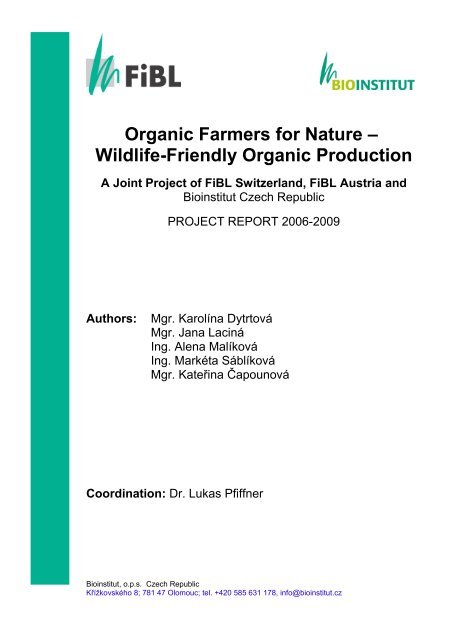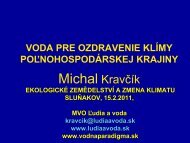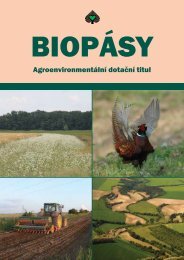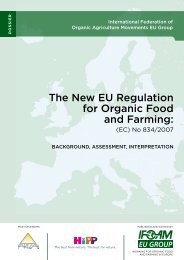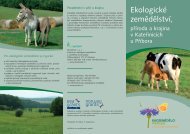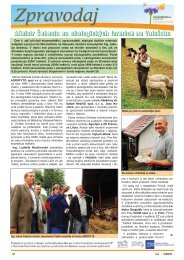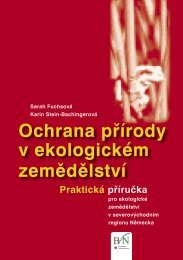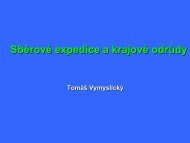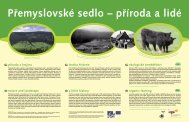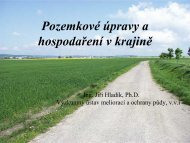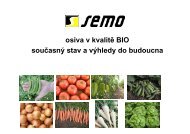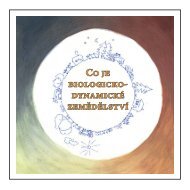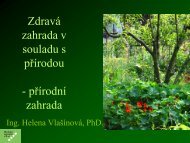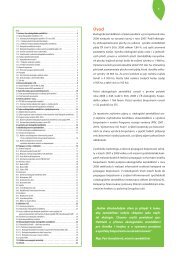Download HERE - Bioinstitut, o.p.s.
Download HERE - Bioinstitut, o.p.s.
Download HERE - Bioinstitut, o.p.s.
You also want an ePaper? Increase the reach of your titles
YUMPU automatically turns print PDFs into web optimized ePapers that Google loves.
Organic Farmers for Nature –<br />
Wildlife-Friendly Organic Production<br />
A Joint Project of FiBL Switzerland, FiBL Austria and<br />
<strong>Bioinstitut</strong> Czech Republic<br />
PROJECT REPORT 2006-2009<br />
Authors:<br />
Mgr. Karolína Dytrtová<br />
Mgr. Jana Laciná<br />
Ing. Alena Malíková<br />
Ing. Markéta Sáblíková<br />
Mgr. Kateřina Čapounová<br />
Coordination: Dr. Lukas Pfiffner<br />
<strong>Bioinstitut</strong>, o.p.s. Czech Republic<br />
Křížkovského 8; 781 47 Olomouc; tel. +420 585 631 178, info@bioinstitut.cz
1. SUMMARY<br />
In 2006 <strong>Bioinstitut</strong> joined the international project “Diversity Blossoms on Organic<br />
Farms– Wildlife-Friendly Organic Production”, the aim of which is the conservation of<br />
the species-rich countryside and landscape on the level of organic farms. Throughout<br />
its duration the project was well received by farmers, for whom it was primarily intended,<br />
by government bodies and by the general public. It thus became one of the main<br />
projects of <strong>Bioinstitut</strong>.<br />
In its first phase the project focused on general education of organic farmers. The aim<br />
was to address farmers who were interested in increasing the biological diversity on<br />
their farms and to gradually create an informed community that want actively take part<br />
in measures which increase biodiversity. A national-wide network of 37 nature-friendly<br />
farms was established. These farms includes more than 10’000 ha agricultural land.<br />
During the growing season scientific research is carried out on these farms, locations<br />
requiring care are identified by botanist and zoologist. After consultation with the farmer,<br />
these specialists propose a necessary set of measures to support diversity of species<br />
on the farm land. Farmers made frequently use of this advisory services. Educational<br />
information boards were located on appropriate farms and excursions were organised<br />
on these locations. The concept to build up model farms was positively evaluated by the<br />
Ministry of Agriculture and the Ministry of the Environment as they serve as the practical<br />
examples of nature-friendly farming in the landscape of the Czech Republic. A range of<br />
educational seminars was organised, not only for farmers involved in the project, but<br />
also for the public, government bodies, NGOs and secondary school students, focusing<br />
on the relationship between farming and nature protection. Many advisory visits were<br />
made to organic farms and applications were worked out for financial support from the<br />
Ministry of the Environment towards planting trees and shrubs on farms.<br />
In the second phase of the project we worked on publication of the outputs of the<br />
project. We completed the contents of the catalogue “A place for nature on your farm”<br />
and produced a Czech version of an educational DVD about nature protection on a<br />
German bio-dynamic farm in Brodowin. We participated in the translation of a practical<br />
guide for organic farming in north-eastern Germany “Nature Protection in Organic<br />
Farming”, which advises organic farmers on a range of measures for the benefit of the<br />
countryside. In terms of lobbying, we have held a number of workshops with experts<br />
from research institutes and government representatives. There we have discussed the<br />
future concept of agro-environmental programmes and methods of conservation for the<br />
species-rich countryside and landscape on the level of agricultural enterprises with the<br />
help of farm nature conservation plans. We have also published numerous specialist<br />
articles on this theme as well as press releases and regular monthly contributions of<br />
thematic articles “Organic Farmers for Nature Newsletter” in the magazine Bioměsíčník.<br />
<strong>Bioinstitut</strong>, o.p.s. Czech Republic<br />
Křížkovského 8; 781 47 Olomouc; tel. +420 585 631 178, info@bioinstitut.cz
Throughout the project <strong>Bioinstitut</strong> has made every effort to actively promote the project.<br />
This has been successful partly due to the media boom in the Czech Republic relating<br />
to organic produce and organic farming in general. We have tried to exploit this for the<br />
promotion of aspects of environmental protection which relate to consumption of<br />
organic produce. In total the project was cited in the media 58 times (printed and<br />
electronic media, including radio and TV).<br />
Since 2006 we have been successful in obtaining funding for the afore mentioned<br />
activities in the form of two grants from the Ministry of Agriculture (in 2008 and 2009)<br />
and, via the Civil Society Development Foundation, two EEA grants from Iceland,<br />
Lichtenstein and Norway within the EEA Financial Mechanism and the Norwegian<br />
Financial Mechanism (2007, 2008). We can state that this international project, initiated<br />
in 2006 by FiBL Frick and supported in 2006-2009 by the Lichtenstein Sonnenwiese<br />
Stiftung Foundation, achieved its aim and due to the support of these donors could be<br />
developed to the extent described herein. <strong>Bioinstitut</strong> would like to continue in this<br />
project and we are currently working on new grant applications that will ensure further<br />
development of the network of nature-friendly organic farms. We intend to further<br />
cooperate with involved farms in the network and continue the work on building-up the<br />
model farms.<br />
In January 2008, our project was chosen for a presentation and a diplomatic visit of Mr.<br />
Alex V. Winther (Deputy Head of Mission – Royal Norwegian Embassy) and Mrs. Vanja<br />
Bentsen Kleven from the Norwegian Helsinki Committee. The report from the visit was<br />
placed on central webpage of EEA and Norway Grants: http://www.eeagrants.org/id/605<br />
In 2008, our project was awarded as one of the best project in the priority area -<br />
Protection of Environment, realized in the first call of EEA and Norway grants in the<br />
Czech Republic.<br />
<strong>Bioinstitut</strong>, o.p.s. Czech Republic<br />
Křížkovského 8; 781 47 Olomouc; tel. +420 585 631 178, info@bioinstitut.cz
CONTENTS<br />
1. SUMMARY .......................................................................................2<br />
2. DEVELOPMENT OF THE PROJECT ...........................................................5<br />
2. 1. Building a network of organic farms, work with members joining the network 5<br />
2. 2. Project team and cooperating organisations.........................................7<br />
2. 3. Buildup of a community of Organic Farmers for Nature...........................7<br />
3. RESEARCH ......................................................................................10<br />
3. 1. Methodology for mapping farms.......................................................10<br />
3. 2. Scientific monitoring of farms.........................................................10<br />
4. ADVISORY SERVICES ..........................................................................14<br />
4. 1. Practical advice...........................................................................14<br />
4. 2. Group advisory work and educational events......................................14<br />
5. WORK WITH THE PUBLIC ....................................................................16<br />
5. 1. Educational events.......................................................................16<br />
5. 2. Information boards on model farms..................................................21<br />
5. 3. Leaflets.....................................................................................22<br />
5. 4. News.........................................................................................23<br />
5. 5. Guidebooks.................................................................................23<br />
5. 6. Production of educational film on DVD..............................................25<br />
5. 8. Media........................................................................................26<br />
5. 9. Specialist public...........................................................................27<br />
Besides general educational activity among the public, <strong>Bioinstitut</strong> also organises numerous<br />
events and lectures where practical findings from nature protection on organic farms are<br />
discussed with specialists......................................................................27<br />
6. POLITICAL LOBBYING ........................................................................28<br />
COOPERATION WITH THE MINISTRIES OF AGRICULTURE AND THE ENVIRONMENT . 28<br />
7. COOPERATION WITH FIBL FRICK AND FIBL VIENNA ....................................29<br />
<strong>Bioinstitut</strong>, o.p.s. Czech Republic<br />
Křížkovského 8; 781 47 Olomouc; tel. +420 585 631 178, info@bioinstitut.cz
ACKNOWLEDGEMENT ............................................................................29<br />
2. Development of the project<br />
2. 1. Building a network of organic farms, work with members joining the network<br />
Development of the network Wildlife-Friendly Organic<br />
Production in the Czech Republic<br />
Number of organic farms in the<br />
network<br />
40<br />
35<br />
30<br />
25<br />
20<br />
15<br />
10<br />
5<br />
0<br />
34<br />
37<br />
23<br />
10<br />
2006 2007 2008 2009<br />
Year<br />
2006<br />
In the second half of 2006 we began building the network of nature-friendly farms and<br />
10 enterprises were selected for the project. The first visits were made to the farms.<br />
2007<br />
In 2007 the network included 23 organic farms across the whole Czech Republic. In that<br />
year six of these farms were chosen as model farms, on which scientific research was<br />
begun and a farm plan for considerate management was drawn up. In selecting the<br />
farms we used several indicators for business-wide analysis of performance in nature<br />
protection, which were developed by our colleagues in FiBL (e.g. the proportion of<br />
organic compensation areas; retention of small-scale structure; promotion of own<br />
efficiency in nature protection in direct sale and/or PR work on the theme of nature<br />
protection and farming etc.).<br />
<strong>Bioinstitut</strong>, o.p.s. Czech Republic<br />
Křížkovského 8; 781 47 Olomouc; tel. +420 585 631 178, info@bioinstitut.cz
2008<br />
In 2008 a total of 34 organic farms with an active interest in nature protection were<br />
involved in the project. Their combined acreage was 8,054 ha, which represented 2.5%<br />
of organically farmed land in the Czech Republic.<br />
2009<br />
The network currently consists 37 organic farms across the whole Czech Republic (map<br />
in Fig.1), which represents approx. 10,750 ha of organically managed farm land. Our<br />
work with members of the network involves farm visits, individual advice, telephone and<br />
email contact and consultation. All actors/stake holders in the project receive the<br />
specially published “Organic Farmers for Nature” Bulletin. The farms were successively<br />
visited and given individual guidance. Field consultancywere aimed to increase the<br />
species diversity on the whole farm, both on agricultural land and non-productive land.<br />
In relation to this, data is gathered for the compilation of a farm plan (especially<br />
botanical research) and certain measures are proposed (e.g. planned planting).<br />
Consultancy is then linked to the possibilities of utilizing subsidies for the recommended<br />
measures.<br />
Abb.1 Organic Farmers for Nature Network in the Czech Republic in 2009. The red dots indicate<br />
enterprises involved in the “Organic Farmers for Nature” network in the Czech Republic. (2009)<br />
2. 2. Project team and cooperating organisations<br />
The following people were involved in implementation of the project in 2006-2009:<br />
Jiří Urban – fundraising, work with farms, international cooperation<br />
<strong>Bioinstitut</strong>, o.p.s. Czech Republic<br />
Křížkovského 8; 781 47 Olomouc; tel. +420 585 631 178, info@bioinstitut.cz
Karolína Dytrtová – project coordinator, financial manager, international<br />
cooperation<br />
Alena Malíková – farm adviser, manager of farm network<br />
Stanislava Čížková - botanist<br />
Kateřina Čapounová and Markéta Sáblíková – PR workers<br />
Jana Laciná – project activity coordinator since 2009<br />
Tomáš Berka – nature protection adviser, botanist<br />
Jana Kvapilová and Lucie Košťálová – administration<br />
We cooperated with a number of organisations, apart from our project partners FiBL<br />
Frick and FiBL Vienna, for example PPO-BIO Association of Organic Farmers, Palacky<br />
University in Olomouc, Daphne ČR – Institute for Applied Ecology, the Institute of<br />
Agricultural Economics and Information, the PRO-BIO League uniting organic<br />
consumers and friends of organic farming.<br />
2. 3. Buildup of a community of Organic Farmers for Nature<br />
The project had, and still has, the aim of improving communication and awareness in<br />
the community of organic farmers with a approach to protect of nature and landscape.<br />
The project supported four basic prerequisites for a functioning community:<br />
• collective interest (protection of nature and landscape unites members of the<br />
community and limits them in comparison with others),<br />
• forming a relationship (the activities of the project supported interaction between<br />
individual members),<br />
• interaction (mutual exchange of organic farmers’ approach and practical<br />
experience),<br />
• attraction (the project supported informal meetings and collective experience).<br />
Some of the events held within the project:<br />
2007<br />
In 2007 we prepared an excursion to Norway and Sweden for farmers involved in the<br />
project. From 14 th – 23 rd September 2007 we visited 7 organic farms, familiarised<br />
ourselves with practical examples or nature protection and visited Bioforsk – the<br />
Research Institute for Organic Farming in Norway. The excursion was highly-rated by<br />
the participants and fulfilled both a specialist purpose – supplying new knowledge and<br />
inspiration in the field of organic farming, as well as helping to build the community.<br />
<strong>Bioinstitut</strong>, o.p.s. Czech Republic<br />
Křížkovského 8; 781 47 Olomouc; tel. +420 585 631 178, info@bioinstitut.cz
Abb. 2 Excursion to organic farms in Norway<br />
2008<br />
<strong>Bioinstitut</strong> and the PRO-BIO Association prepared an informal event – the first Bio-Ball<br />
– for all farmers linked to the project, other friends of organic farming and lovers of<br />
organic wine. The event provided an opportunity for a friendly social evening and a<br />
celebration of the previous year in the organic sector. The first Bio-Ball took place on<br />
15 th February 2008 in Horka nad Moravou near Olomouc.<br />
Abb. 3 Presentation of organic produce to winners of the tombola at the Bio-Ball<br />
3. Research<br />
3. 1. Methodology for mapping farms<br />
During the project “Methodology for mapping farms” was completed. This focused on<br />
mapping biota and the subsequent increase in biodiversity on farms. The methodology<br />
focuses on evaluation of natural and semi-natural biotopes as well as cultural biotopes<br />
and biotopes heavily influenced by human activity. The aim is to obtain an overview of<br />
the current state of the farm land and, on the basis of the data gained, to propose the<br />
optimal management regime or the creation of appropriate landscape elements. At<br />
present the methodology is undergo a scientific review.<br />
<strong>Bioinstitut</strong>, o.p.s. Czech Republic<br />
Křížkovského 8; 781 47 Olomouc; tel. +420 585 631 178, info@bioinstitut.cz
Abb. 4 Mapping in the Country Life Company with <strong>Bioinstitut</strong> staff<br />
3. 2. Scientific monitoring of farms<br />
In the years 2007-2009 mapping was carried out using the methodology (details see<br />
previous reports) on 13 selected organic farms. On the basis of the mapping a farm<br />
plan for nature-friendly management was worked out for the majority of these farms.<br />
The aim of monitoring on farms was as follows:<br />
- evaluation of the state of the farm with regard to the level of biodiversity<br />
- identification of critical areas – with regard to soil, water and biodiversity<br />
- proposal of appropriate measures (via the farm plan)<br />
- confirmation with new methodology of mapping in the field and rectifying<br />
deficiencies<br />
- acquisition of information about the scientific value of the farm and utilisation<br />
of the data for promotion (information boards, leaflets)<br />
- use of the acquired information for grant applications for the renewal and<br />
creation of new biotopes (planting, fencing etc.).<br />
3.2.1. Some success stories from monitored model farms:<br />
Organic farming on meadows and pastures of Přemyslovské sedlo in Jeseníky Mts.<br />
One of the nicest places of the Hrubý Jeseník Mountains, Přemyslovské sedlo (The<br />
Premysl Saddle) has been farmed since the half of the 17th century. A patchwork of<br />
small fields, meadows and pastures of individual farms has been replaced after<br />
collectivization by vast complexes of consolidated land. Ivan Pur, who has been farming<br />
this land organically since 1994, was instrumental in resuming more nature-friendly<br />
cultivation of this unique territory. The “Letní stráň“ (Summer Hillside) farm specializes<br />
<strong>Bioinstitut</strong>, o.p.s. Czech Republic<br />
Křížkovského 8; 781 47 Olomouc; tel. +420 585 631 178, info@bioinstitut.cz
in husbandry of the old Scottish meat breed galloway. He endeavours to respect nature<br />
and farms on species-rich meadow communities using the methods that maintain<br />
diversity of grassland and create environment for various representatives of animals. In<br />
2008, Přemyslovské sedlo was declared a temporarily protected land area „Letní stráň“<br />
(Summer Hillside) and our project outputs directly contributed to this declaration.<br />
Organic farming in a sensitive way adapts its activities to soil and climatic conditions on<br />
one hand and the needs of endangered species on the other. However, the farmer<br />
facilitates the preservation and growth of populations of rare plants and animals, also by<br />
intentional creation of „the places for nature“, that also contribute to the shaping of the<br />
beauty of the farmed landscape. Maintaining groves and hedgerows in the fields,<br />
solitaire trees, taken down stones, creating windbreak strips, as well as gradual<br />
harvesting of mowed areas represent places where small animals can hide and find<br />
feed. The postponement of mowing to the turn of July and August enables to ripen and<br />
drop seeds to orchids and other endangered species. The unique quality of<br />
Přemyslovské sedlo has been confirmed by botanical and zoological surveys. In many<br />
localities the incidence of endangered plants and animals has been confirmed – among<br />
plants, e.g. the Common Spotted Orchid (Dactylorhiza fuchsii), the Western Marsh<br />
Orchid (Dactylorhiza majalis), the Fragrant Orchid (Gymnadenia conopsea), the Orange<br />
Lily/the Fire Lily (Lilium bulbiferum), among butterflies, e.g. The Purple Emperor<br />
(Apatura iris), the Mazarine Blue (Cyaniris semiargus) or the Purple-Shot Copper<br />
(Lycaena alciphron), among birds then the Corncrake (Crex crex) or the Red-Back<br />
Shrike (Lanius collurio).<br />
Abb. 5 The unique quality of Přemyslovské sedlo - endangered plants and animals<br />
<strong>Bioinstitut</strong>, o.p.s. Czech Republic<br />
Křížkovského 8; 781 47 Olomouc; tel. +420 585 631 178, info@bioinstitut.cz
Organic farming on the Janova hora in Krkonoše Mts.<br />
The Hucul Farm is situated in the village of Vítkovice in the western part of the<br />
Krkonoše Mountains. The Karbusický family organically farms the land area of 300<br />
hectares of sloping meadows and pastures that reach the altitude of 1,100 m above sea<br />
level and are located directly in the Krkonoše National Park. In the 1980’s this farm was<br />
one of two localities in then Czechoslovakia, where intense efforts aimed at preserving<br />
gene pool of Hucul horses were in progress. A herd consisting of eighty horses which is<br />
now grazing on the hillsides around the farm, ranks in terms of its quality and sized<br />
among the best Hucul breeds in the Czech Republic. A typical mountain climate is a<br />
suitable environment also for the Scottish mountain cattle breed Highland. For horses<br />
and cattle, the all-year-round breeding on pastures, even in harsh winter months, is<br />
beneficial. The farm pursues agro-tourism with accommodation in its own boarding<br />
house. The meat of animals slaughtered in the nearby slaughterhouse can be tasted in<br />
a cosy restaurant. The farm produces compost from organic farming raw materials. The<br />
Hucul Farm is an example of an enterprise that fulfils the so-called multifunctional<br />
organic farming model. Theoretical principles of sustainable development are fulfilled<br />
here directly in practice. Benefits of the organic farm a reflected in a wide range of<br />
activities (all-year-round employment in the region where otherwise only seasonal work<br />
is available; agro-tourism; promotion of local products; animal welfare; ecological<br />
education in practice; strengthening direct links between a farmer and a consumer;<br />
recondition horse-riding for handicapped children).<br />
The mountain landscape cultivated for centuries is gradually changing. Regular care for<br />
sloping meadows and pastures with typical taken down stones and walls requires much<br />
efforts that less and less people are nowadays willing to do. The Karbusický family is<br />
one of those few families that keep on farming in this region. Maintaining forest-free<br />
locations by extensive grazing and nature-friendly mowing is essential for preserving<br />
the landscape specifics and for preserving these specific locations that are of vital<br />
importance for many plant and animal species. During the monitoring, the presence of a<br />
number of protected types of plants was approved, such as e.g. orchids from the<br />
Orchideaceae family, several tens of species of hawkweeds of the Hieracium genus, the<br />
Martagon Lily (Lilium martagon), the Willow Gentian (Gentiana asclepiadea), the Spring<br />
Snowflake (Leucojum vernum), the European Common Twayblade (Listera ovata),<br />
Fragran Orchid (Gymnadenia conopsea). Streamlets and waterlogged land are lined<br />
with thistles (Cirsium spp.), marsh marigolds (Caltha spp.), the Wood Club Rush<br />
(Scirpus sylvatica), the Cow Parsley (Chaerophyllum hirsutum), the White Butterbur<br />
(Petasites albus) or the Large Bittercress (Cardamine amara). On meadows the<br />
endangered Corncrake bird (Crex crex) lives, due to whom the farmer postpones the<br />
date of mowing in order that the bird might successfully nest.<br />
<strong>Bioinstitut</strong>, o.p.s. Czech Republic<br />
Křížkovského 8; 781 47 Olomouc; tel. +420 585 631 178, info@bioinstitut.cz
Abb. 6 The Hucul Farm - Maintaining forest-free locations by extensive grazing and nature-friendly<br />
mowing is essential for preserving the landscape specifics<br />
4. Advisory services<br />
4. 1. Practical advice<br />
During the term of the project the <strong>Bioinstitut</strong> workers provided advisory services to farms<br />
involved in the “Organic Farmers for Nature” project. On the basis of mapping of the<br />
farm land a farm plan for nature-friendly management is worked out. This focuses on<br />
increasing the biodiversity of the farm land. The plan for nature-friendly management<br />
gives simple and comprehensible advice on how to conserve ecologically valuable land,<br />
or how to extend it, establish it and improve its quality. Advice is also given regarding<br />
the possibilities of obtaining grants from the Czech Ministry of the Environment. If<br />
necessary, farmers are given a help in making applications.<br />
4. 2. Group advisory work and educational events<br />
2007<br />
On 26 th – 27 th April 2007 a course was held, in cooperation with Palacky University in<br />
Olomouc, entitled Organic Agriculture from a Scientific Viewpoint. The theme was the<br />
relationship of organic agriculture and other agro-environmental measures to<br />
biodiversity. As well as Czech experts focusing on soil research, plant communities on<br />
arable land and grassland, insects and birds, there were also presentations by foreign<br />
speakers - Johannes Frühauf, BirdLife, Austria and Roman Graf, Schweizwrische<br />
Vogelwarte, Switzerland. The theoretical element was taken up in an excursion to the<br />
Letní stráň farm of Mr Ivan Pur, where course participants were shown a specific<br />
example of the Organic Farmers for Nature project<br />
<strong>Bioinstitut</strong>, o.p.s. Czech Republic<br />
Křížkovského 8; 781 47 Olomouc; tel. +420 585 631 178, info@bioinstitut.cz
Abb. 6 Participants in the field of the course in April 2007<br />
2008<br />
Once again we organised a seminar for farmers involved in the network and the public<br />
on the themes of “Functional Biodiversity and Organic Farming” and “Biodynamic<br />
Farming”. The seminar took place on 4 th - 5 th February in the Sluňákov ecological centre<br />
near Olomouc. The aim was for foreign experts to present both these relatively new<br />
themes. Talks were given by e.g. Trygve Sund (Norway), Reidun Pommerasche<br />
(Norway), Kristy McKinnon (Norway) and others. Participants evaluated the seminar as<br />
being very beneficial; having well-chosen themes and speakers (8 talks were given).<br />
The two-day programme gave space for discussion between participants, an informal<br />
social evening and a tour of the Sluňákov centre low-energy building, where the<br />
seminar was held. Over the two days a total of 59 people took part in the seminar.<br />
2009<br />
Following on from the success of last year’s events we organized another seminar in<br />
the Sluňákov centre (17.-18.02.09) for specialists and the general public. This time the<br />
chosen theme was “Water and pollinating insects in the agricultural landscape”.<br />
The first day was devoted to the theme of water from various perspectives. Discussion<br />
focused on the problem of pollution of water sources due to agricultural activity, water<br />
erosion of soil, the possibilities and importance of retaining water in the landscape and<br />
the influence of changes in the agricultural landscape on global warming. The first day<br />
of the seminar was accompanied by a short excursion to the Litovelské Pomoraví<br />
Protected Landscape Area with the aim of introducing participants to revitalisation<br />
projects in the vicinity of the ecological centre and aspects of the fluvial landscape in the<br />
Protected Landscape Area.<br />
<strong>Bioinstitut</strong>, o.p.s. Czech Republic<br />
Křížkovského 8; 781 47 Olomouc; tel. +420 585 631 178, info@bioinstitut.cz
The second day focused on the problem of insect pollination in the agricultural<br />
landscape and the current critical state of decline in bee-keeping. Seminar participants<br />
were acquainted with the significance of commercially-kept bees, solitary bees and<br />
bumble-bees for a healthy, functioning landscape and also the importance of balanced<br />
diversification of the landscape for the life of insects. Besides this, the seminar raised<br />
the question of solitary bees as a significant bio-indicator of quality of the environment<br />
reacting sensitively to its pollution.<br />
The seminar was attended by a total of 47 people including farmers, advisers,<br />
representatives of governmental bodies and students.<br />
Abb. 7 Seminar at Sluňákov 2009<br />
5. Work with the public<br />
5. 1. Educational events<br />
The network of farms connected to the “Organic Farmers for Nature” project carry out<br />
active protection of nature and landscape on a regional level. The model farms serve as<br />
“flourishing examples” to both organic and conventional farms in education of the public.<br />
<strong>Bioinstitut</strong> organises open days on the farms, where these specific examples are used<br />
to present the benefits of organic farming in terms of protection of nature and<br />
landscape. These activities have increased the awareness of the activities of organic<br />
farmers among the specialist and general public.<br />
<strong>Bioinstitut</strong>, o.p.s. Czech Republic<br />
Křížkovského 8; 781 47 Olomouc; tel. +420 585 631 178, info@bioinstitut.cz
Abb. 8 Open-day on Mlýnec farm<br />
2007<br />
In 2007 the project included the organisation of two open-day events and one excursion<br />
to organic farms within the network:<br />
The first event took place on 23.06.07 on the Mlýnec farm near Tábor. As well as<br />
about 100 members of the general public, the event was attended by members<br />
of the local council, public institutions and representatives of local community<br />
organisations. <strong>Bioinstitut</strong> introduced visitors to the benefits of organic farming, not<br />
only for biodiversity of the Mlýnec valley, but also the benefits for local<br />
communities and residents of the surrounding area.<br />
On 8 th September, in the month traditionally declared “Organic Farming and Food<br />
Month” in the Czech Republic, an open-day was held on the organic farm of<br />
Josef Folta in Kateřinice near Příbor. The farm is included in the model farm<br />
network primarily due to the uniquely natural fusion of the agroecosystem with<br />
the local landscape. It is precisely this integration that provides a multitude of<br />
“places for nature”, offering refuge to over 85 species of birds. During the day the<br />
farm was visited by approximately 120 participants.<br />
A specialist excursion was held on 23.11.07 in connection with a seminar on<br />
organic animal-husbandry. It was organised by <strong>Bioinstitut</strong> in cooperation with the<br />
Animal Protection Trust. The participants were predominantly teachers from<br />
secondary schools of agriculture as well as current and newly-converted organicmilk<br />
producers. The destination was therefore the Agrofyto Lidečko enterprise,<br />
included in “Farmers for Nature” network, which specialises in organic dairy and<br />
beef cattle production within a whole farm approach for nature conservation..<br />
<strong>Bioinstitut</strong>, o.p.s. Czech Republic<br />
Křížkovského 8; 781 47 Olomouc; tel. +420 585 631 178, info@bioinstitut.cz
The excursion then continued to the Valašské Mlékárny dairy where the organic<br />
milk from the Agrofyto farm is processed.<br />
Within the scope of educational activities, the staff of <strong>Bioinstitut</strong> also gave talks at<br />
numerous seminars and meetings for schools and the general public. A total of five<br />
lectures were prepared which presented the “Organic Farmers for Nature” project.<br />
2008<br />
In 2008 the project included the organisation of an open-day and two excursions to<br />
organic farms included in the network:<br />
On 25.05.08 an open-day was held on the Hucul organic farm. The farm has a<br />
long history of cooperation with the Krkonoše National Park in which the farm<br />
manages numerous localities featuring rare and protected species of plants and<br />
wildlife. The farm also has a long-term commitment to maintaining important<br />
landscape structure – e.g. stone walls and game refuges. The farm was voted<br />
Organic arm of the Year 2007 by the PRO-BIO organisation. Within the day of<br />
celebration <strong>Bioinstitut</strong> organised a lecture “A tidy landscape isn’t always a healthy<br />
landscape” and the official programme concluded with a volunteer project<br />
“Landscape gardening: try it yourself” which focused on planting shrubs.<br />
On 10.06.08 an excursion was made to the organic orchard of Bedřich Plíšek in<br />
Vinice near Hořice. This enterprise is involved in the “Organic Farmers for<br />
Nature” project. Elements of functional biodiversity are actively used in the<br />
orchard as well as biological protection of trees and the creation of refuges for a<br />
range of beneficial wildlife.<br />
Abb. 9 In Bedřich Plíšek’s orchard<br />
<strong>Bioinstitut</strong>, o.p.s. Czech Republic<br />
Křížkovského 8; 781 47 Olomouc; tel. +420 585 631 178, info@bioinstitut.cz
2009<br />
On 12.11.08 an excursion was made to the Country Life enterprise in<br />
Nenačovice. This farm is managed with regard for soil fertility, effort to minimise<br />
water and wind erosion and to support and care for species diversity of cultivated<br />
crops and the surrounding countryside. Among other things, the excursion also<br />
took participants to a mill and bakery on the farm and included an organic foodtasting.<br />
The event was attended by 57 people, including organic farmers,<br />
students of secondary schools of agriculture as well as aspiring bakers and other<br />
processors.<br />
In 2009 the project included two excursions to organic farms involved in the network:<br />
On 17.06.09 students of the Secondary School of Agriculture in Poděbrady<br />
visited the Hucul farm on Janova Hora in the Krkonoše region. The students<br />
spent the day on the farm, where they were acquainted not only with the<br />
breeding of Hucul horse, on which they could ride, but primarily with the day to<br />
day running of the farm to gain first-hand experience of the hard work involved<br />
in farming in the Krkonoše hills. Within practical volunteer work they were<br />
involved in the removal of dock from organic pasture, a job that has to be done<br />
physically, without the use of herbicide. This ecological approach is also<br />
appropriate for this area because the farm has land within the National Park.<br />
The students prepared a brief report on their practical work and created a<br />
presentation about the farm, using photographs they had taken themselves, and<br />
used this during project days at their school.<br />
On 19.06.09 an excursion was made to the Kadeřávek family farm in Věcov.<br />
The farm specialises in sheep-breeding and also manages meadows and<br />
pasture in the Žďárské Vrchy Protected Landscape Area. The owners have<br />
been actively involved in planting greenery and the formation of marshes within<br />
the farmland. The excursion was made within a workshop focusing on farm<br />
plans.<br />
<strong>Bioinstitut</strong>, o.p.s. Czech Republic<br />
Křížkovského 8; 781 47 Olomouc; tel. +420 585 631 178, info@bioinstitut.cz
Abb. 10 A walk through the ecological landscape of the Kadeřávek farm.<br />
5. 2. Information boards on model farms<br />
Between 2007- 2009 the project included the production of information boards to<br />
acquaint the public with the farming approach and scientific points of interest on given<br />
farms. The boards are mounted on solid wooden frames and are complete with plastic<br />
information posters. The boards are located on popular recreational routes (hiking trails,<br />
approach roads to farms). The aim is to introduce not only visitors, but also the local<br />
residents, to the character of organic farming. Each board is original in the information it<br />
gives, explains the history of the given location, the production focus of the farm and<br />
explains how organic farming can benefit landscape, nature and wildlife. <strong>Bioinstitut</strong><br />
compiles the information in cooperation with the farmers, who thus have the opportunity<br />
to explain certain specific details to people visiting the farm or walking in the area. The<br />
boards explain e.g. the reason for uncut strips on grassland, late mowing of meadows<br />
to protect the corncrake, the function of small structures in the landscape or why some<br />
breeds can be kept outside all year. A total of 13 information boards were located on 9<br />
model farms. All the boards are built in the same style with the logo of the “Organic<br />
Farmers for Nature” project.<br />
<strong>Bioinstitut</strong>, o.p.s. Czech Republic<br />
Křížkovského 8; 781 47 Olomouc; tel. +420 585 631 178, info@bioinstitut.cz
Abb. 11 An information board on the premises of Letní Stráň<br />
5. 3. Leaflets<br />
In spring 2007 the first information leaflet was produced which introduced the basic<br />
philosophy of the project. It was the first leaflet in the Czech Republic to present organic<br />
farming as a tool for protection of nature and landscape. The leaflet refers to further<br />
sources of information and offers advice on care of the agricultural landscape. The<br />
leaflet mainly addresses farmers, to stimulate their interest in the “Organic Farmers for<br />
Nature” project, but also other target groups such as non-profit organisations active in<br />
nature protection, local government and last, but not least, the general public (e.g.<br />
consumers of organic product).<br />
During the project the information produced on the information boards was also<br />
published in the form of leaflets, which were provided to the associated farms to assist<br />
with their promotion.<br />
<strong>Bioinstitut</strong>, o.p.s. Czech Republic<br />
Křížkovského 8; 781 47 Olomouc; tel. +420 585 631 178, info@bioinstitut.cz
Abb. 12 Leaflets<br />
5. 4. News<br />
In a regular column in the nationwide magazine „Bio měsíčník pro trvale udržitelný život“<br />
(Organic Monthly for Sustainable Living) we publish specialist information about organic<br />
farming and biodiversity, we inform readers of experience in organic farming and its<br />
related problems from abroad, of current news in the field of OF, grants, etc.<br />
An “Organic Farmers for Nature” newsletter is distributed to all farmers in the PRO-BIO<br />
Association, members of the PRO-BIO League for the protection of consumers of<br />
organic produce, enterprises involved in the “Organic Farmers for Nature Network”. It is<br />
also distributed on a pre-paid basis to the consumer public. Approximately 6000 copies<br />
are printed each month. Between October 2007 and the present day 20 thematic issues<br />
covering such subjects as e.g. organic farming in relation to birds, insects, amphibians,<br />
soil and landscape. They also focus on the agro-environmental grant programme and<br />
how it works abroad. Publications covered the experience of Ireland, England and<br />
Austria.<br />
The regular news column in Bioměsíčník is well received and is currently promoting the<br />
project nationwide. The column attracts further potential participants to join the “Organic<br />
Farmers for Nature” network. An electronic archive of all issues is accessible on the<br />
website www.bioinstitut.cz.<br />
5. 5. Guidebooks<br />
In 2008 <strong>Bioinstitut</strong>, in cooperation with the Natural Science Faculty of Palacky University<br />
in Olomouc, brought out a new publication: Non-forest woody vegetation –<br />
<strong>Bioinstitut</strong>, o.p.s. Czech Republic<br />
Křížkovského 8; 781 47 Olomouc; tel. +420 585 631 178, info@bioinstitut.cz
proposals, planting and maintenance. This booklet, with many illustrational<br />
photographs, gives a detailed view of the function of non-forest woody biotopes in the<br />
landscape, gives a detailed procedure for planning planting, actual planting of trees and<br />
shrubs, including their subsequent maintenance. The guidebook also includes an<br />
orientation overview of costs that can be expected in establishing elements of woody<br />
vegetation. A valuable feature of the guidebook is the appendix, which includes an<br />
index of woody types suitable for planting in the specific conditions of the Czech<br />
Republic.<br />
In cooperation with specialists on protection of nature and landscape, <strong>Bioinstitut</strong><br />
published a new practical guidebook in 2009 entitled “A place for nature on your farm”.<br />
It takes the form of a 60 page colour catalogue with numerous photographs. This<br />
guidebook explains the significance of natural or semi-natural habitat on farmland and<br />
clarifies where we can find such habitat on the farm. The guidebook then goes on to<br />
describe specific types of “place for nature”, warns farmers how these places are<br />
threatened, how to reduce this threat and how to retain or even increase the biological<br />
diversity of wildlife and plants. The guidebook also contains procedures and rules for<br />
establishing new habitat, advice on how to improve conditions for wildlife inhabiting<br />
natural or semi-natural habitat and last, but not least, a brief list of national and European<br />
funds from which financial means can be obtained for the establishment and<br />
maintenance certain types of habitat. The guidebook was distributed free of charge to all<br />
members of the “Organic farmers for Nature” network and is also issued free at events<br />
and seminars organised by <strong>Bioinstitut</strong>. It is also freely available on the <strong>Bioinstitut</strong> website.<br />
Abb.13 Title pages of the publications Non-forest woody vegetation – proposals, planting and<br />
maintenance and A place for nature on your farm<br />
<strong>Bioinstitut</strong>, o.p.s. Czech Republic<br />
Křížkovského 8; 781 47 Olomouc; tel. +420 585 631 178, info@bioinstitut.cz
5. 6. Production of educational film on DVD<br />
Within the project a Czech translation was produced of a German educational film on<br />
DVD entitled “Organic Farming – optimisation with regard to nature protection – based<br />
on the Brodowin biodynamic farm”. The film describes approaches for nature-friendly<br />
farming and demonstrates specific measures which can help to support wildlife on the<br />
farm. Original production of the DVD resulted in 100 copies. Each farm involved in the<br />
“Organic Farmers for Nature” network received a copy. The rest were distributed free of<br />
charge and all copies were given out within 4 months.<br />
Consequently, the translation of a practical guide for organic farming in north-eastern<br />
Germany “Nature Protection in Organic Farming”, which advises organic farmers on a<br />
range of measures for the benefit of the countryside, was accomplished.<br />
Abb. 14 Title pages - DVD entitled<br />
“Organic Farming –<br />
optimisation with regard to<br />
nature protection” and<br />
practical guide for organic<br />
farming in north-eastern<br />
Germany “Nature<br />
Protection in Organic<br />
Farming”<br />
5. 7. Website<br />
All information and current<br />
events relating to our project<br />
can be found on the website<br />
http://www.bioinstitut.cz/ekozemedelci.htm. This year, with the help of FiBL, we have also<br />
set up a counter for visitors to the website, which will help us to evaluate the success<br />
and popularity of our website.<br />
5. 8. Media<br />
Throughout the project <strong>Bioinstitut</strong> has made every effort to actively promote the project.<br />
This has been successful partly due to the media boom in the Czech Republic relating<br />
to organic produce and organic farming in general. We have tried to exploit this for the<br />
promotion of aspects of environmental protection which relate to consumption of<br />
organic produce. The most successful item was a presentation in the documentary<br />
series “Náš venkov” (Our Countryside) filmed by Czech TV. The programme featured<br />
organic management of the Mlýnec farm and was broadcast on 29.09.07. In the<br />
programme the owner of the farm, Jaroslava Marková, spoke about the benefit of the<br />
project for her farm and the aim of the project was explained by Jiří Urban. A further<br />
<strong>Bioinstitut</strong>, o.p.s. Czech Republic<br />
Křížkovského 8; 781 47 Olomouc; tel. +420 585 631 178, info@bioinstitut.cz
presentation of the project was in a television debate between Jiří Urban and Alena<br />
Malíková for the commercial TV channel Prima and on Czech Radio in 2008. In total the<br />
project was cited in the media 58 times (printed and electronic media, including radio<br />
and TV).<br />
In 2009 the project was significantly promoted in relation to a visit by the Minister of<br />
Agriculture to the Agrofyto farm. A press release was issued by the Ministry of<br />
Agriculture in which the benefits of the “Organic Farmers for Nature” project were<br />
mentioned. The press release was taken up by numerous channels of printed and<br />
electronic media.<br />
5. 9. Specialist public<br />
Besides general educational activity among the public, <strong>Bioinstitut</strong> also organises<br />
numerous events and lectures where practical findings from nature protection on<br />
organic farms are discussed with specialists.<br />
<br />
<br />
A visit by German students of organic agriculture: On 01.06.07 students from the<br />
University of Bonn visited the Letní stráň farm in the Jeseníky region, one of the<br />
model farms. The visitors were introduced to the first farm in the Czech Republic to<br />
be run according to a farm plan for nature-friendly management.<br />
Bioacademy 2007: The international conference, held annually at the end of<br />
June in Lednice na Moravě, had a section dedicated to Organic Farming and<br />
Protection of Nature and Landscape. <strong>Bioinstitut</strong> staff presented the concept of the<br />
project and the methodology of farm plans for nature-friendly farming.<br />
Abb. 15 Bioacademy<br />
<strong>Bioinstitut</strong>, o.p.s. Czech Republic<br />
Křížkovského 8; 781 47 Olomouc; tel. +420 585 631 178, info@bioinstitut.cz
On 21.01.09 at the Palacky University in Olomouc <strong>Bioinstitut</strong> organised a workshop<br />
on agro-environmental measures, rules and problems in keeping them from the<br />
farmer’s viewpoint. The workshop programme was led by Prof. Šarapatka from<br />
Palacky University. Two presentations were given by ministry representatives and a<br />
practical adviser. A wide-ranging discussion then followed on individual agroenvironmental<br />
measures, optimum times for cutting individual types of grassland,<br />
systems of evaluation and proposal of agro-envi measures used abroad, landscape<br />
features and how to map and document them. The workshop was attended by 26<br />
specialists from ministries, universities, research institutes and NGOs.<br />
On 18. - 19. 06. 09 a two-day workshop was held on the Kadeřávek farm. The theme<br />
of the workshop was the need for individual advisory services in the field of agroenvironmental<br />
measures (AEM) and other measures in the relationship between<br />
farmers and protection of nature, landscape, soil and water on a farm level. Experts<br />
from the Czech Republic, Britain and Austria presented the ways of approaching a<br />
farm plan and how to use it in AEM. The workshop was attended by staff from<br />
government bodies, ministries, research organisations, NGOs and accredited<br />
advisors – 25 people in all.<br />
Abb. 16 Discussing the problems of farm plans with experts from abroad<br />
6. Political lobbying<br />
Cooperation with the Ministries of Agriculture and the Environment<br />
The aim of the project is to work out reasoning for the ministries of agriculture and the<br />
environment as the basis for change in the specification of agro-environmental<br />
<strong>Bioinstitut</strong>, o.p.s. Czech Republic<br />
Křížkovského 8; 781 47 Olomouc; tel. +420 585 631 178, info@bioinstitut.cz
measures for the new programme period from 2014. In forming this reasoning we<br />
cooperate with other organisations – Daphne ČR - Institute for Applied Ecology, the<br />
Institute of Agricultural Economics and Information, the Nature and Landscape<br />
Protection Agency. The main aim is the possibility of integrating individual advisory<br />
services and greater flexibility of agro-environmental measures for ecologically sensitive<br />
areas of the Czech Republic. At present we are actively preparing working meetings<br />
with representatives of both ministries.<br />
7. Cooperation with FiBL Frick and FiBL Vienna<br />
During the course of the project a number of meetings were held with colleagues from<br />
FiBL Frick and FiBL Vienna in which we exchanged information about methodical<br />
approaches in carrying out the project. These project meetings were held at least once<br />
a year. Within the project we also visited model farms involved in projects in Austria and<br />
Switzerland.<br />
Common project meetings and visits:<br />
• September 2006 – FiBL Frick (Switzerland) – first trilateral kick-off meeting<br />
• November 2006 – FiBL Frick (Switzerland) – workshop about methodology approach<br />
• June 2007 – Austria/Czech Republic – visit of Austrian and Czech model farms<br />
• August 2007 - FiBL Frick (Switzerland) - visit of Swiss model farms<br />
• November 2007 – FiBL Vienna (Austria) – presentation of project outputs<br />
• September 2008 – Jihlava (Czech Republic) - presentation of project outputs<br />
Abb. 17 With colleagues from FiBL Frick and FiBL Vienna on Czech model farm<br />
Acknowledgement<br />
<strong>Bioinstitut</strong>, o.p.s. Czech Republic<br />
Křížkovského 8; 781 47 Olomouc; tel. +420 585 631 178, info@bioinstitut.cz
We are grateful to Sonnenwiese Stiftung and Stiftung Assistance for their support. The<br />
project received the additional support of a grant from Iceland, Liechtenstein and<br />
Norway through the EEA Financial Mechanism and the Norwegian Financial<br />
Mechanism intermediated by the Civil Society Development Foundation (NROS) and by<br />
a grant from the Ministry of Agriculture, Czech Republic.<br />
<strong>Bioinstitut</strong>, o.p.s. Czech Republic<br />
Křížkovského 8; 781 47 Olomouc; tel. +420 585 631 178, info@bioinstitut.cz


